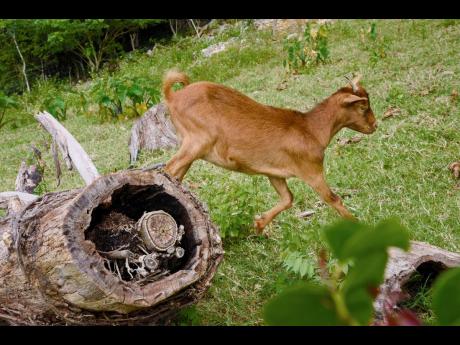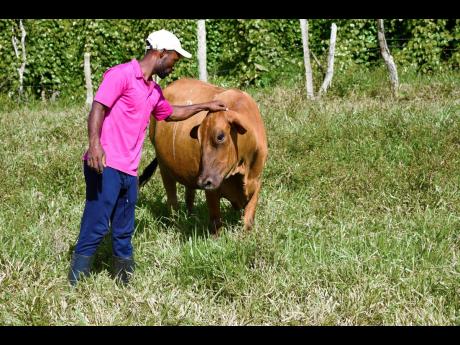No kidding about goats - 27-y-o herdsman finds joy in livestock rearing
LaFrance Gayle started showing an interest in animal rearing from an early age.
The helpful lad would delight in assisting Paul, a goat farmer in Top Hill, Manchester, so much so that the farmer, who admired his dedication, gave him his own kid to raise when he was only eight years old.
Gayle had to learn to organise his time, and through a balancing act, he attended to the young goat before and after school as he allocated time for schoolwork and chores.
“I found out that I had a love for it, so I just continued ... ,” he told The Gleaner. “I like goats. They grow very fast and it’s a good business.”
Within a few years, his herd began to grow, and today, he tends to 30 head of goat and seven cows on a daily basis.
The 27-year-old livestock farmer recently received the Prime Minister’s National Youth Award for Excellence in Agriculture and Agro-Processing, which he said serves as motivation to strive for even greater heights.
Gayle’s passion for agriculture led him to study agricultural science while at Mile Gully High School. He then went to the Ebony Vale HEART Academy in 2013 to get his Level One certification in agriculture.
“I didn’t have the money back then to start, but by selling goats, I got the money to buy the fence and some friends helped me along the way,” he recalled.
He said he has enjoyed the full support of his family as his father was also a farmer.
On a typical day, Gayle rises at 6 o’clock, looks after the goats and then heads to the cow bush, which is a 20-minute trek from his home.
For the rest of the day, he checks the property for openings in the fence and mends them accordingly.
“The goats and the cows can’t be raised on the same plot of land because the cow is a bigger animal. It eats down the grass more, and their digestive system is a little bit different,” he explained.
In high demand
Finding a market for the meat was the least difficult part of the business. In fact, the very first time was “very easy”.
“Goat meat is short in the island. We ship a lot of goat meat every year and we don’t have enough goat farmers in the island at the moment. This is the time for goat meat now – Christmas,” he said with a smile.
He pointed out that though restrictions have been placed on hosting parties and events in a bid to curtail the spread of COVID-19, the demand for goat meat has not declined.
He told The Gleaner that he takes his goats to a slaughterhouse and pays a fee to have them killed.
For the cows, he has had a steady partnership with Juici Patties in Clarendon for the past five years. The cows are transported there and weighed in before processing.
Gayle is eyeing the acquisition of more land to expand and construct proper housing for his herd of goats.
“They don’t have a good shelter at the moment,” he said of the current need. “If it’s raining, they will be able to stay dry. I could feed them in there and they would have less parasites because when you have them in the pasture, they take up more parasites.”
He said when it rains, the goats head to the stony areas in the pasture which prevents them from developing hoof rot.
“To spray the grass with the hand pump is difficult, so I’m planning to get a mist blower,” he added.
He has invested more than $700,000 into the farm for fencing, maintenance of the grass and he periodically hires two people to do fencing and debushing.
The livestock farmer aspires to venture into sheep rearing in the near future, as well as Irish and sweet potato production.
Reflecting on the highs of his career, he puts the recognition from the prime minister as his highest moment so far in the field and hopes that more youth will be inspired by it to venture into agriculture.



